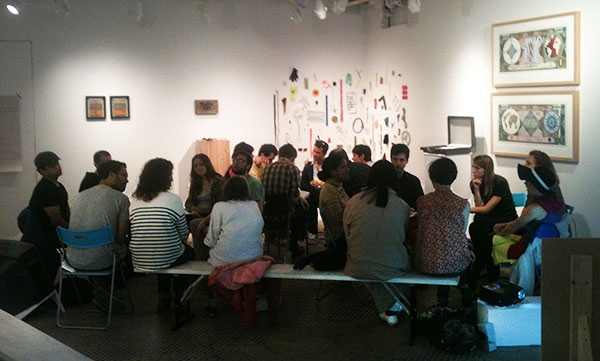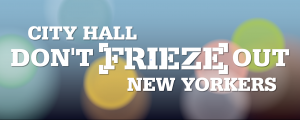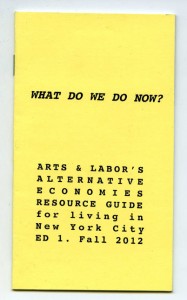The following two statements from Arts & Labor and Teamsters Local 814 were presented at the Frieze New York panel with Nato Thompson and Suzanne Lacy on Friday, May 10, 2013.
- To watch raw video footage of the statements, go here and skip ahead to 15:40.
- Press coverage of the panel appearance is here and here.
Arts & Labor statement on Frieze New York
Thanks to Nato, and especially to Suzanne Lacy, for giving up some of their time on this panel so that we can speak. We respect Suzanne’s work and look forward to hearing her talk, so we will be brief. Suzanne’s longtime commitment to both art and activism brings us all here, and it is our shared sense of the importance of both that prompts us to make this urgent appeal regarding the conditions under which the Frieze art fair is constructed and run.
Arts & Labor is a self-organized group of art workers that includes artists, interns, writers, educators, art handlers, designers, administrators, curators, assistants, and students among other art workers. We came together during Occupy Wall Street to expose economic inequality and exploitative working conditions in our fields and oppose them through direct action and educational initiatives, building solidarity across class, educational, and professional divides.
We stand here today with organized labor to speak out against the inequitable hiring practices of the Frieze New York. Frieze is the only major NYC art fair to be built by non-union workers, now for the second year in a row.
The ground on which this tent stands is public: it belongs to us all. When we lend it to Frieze, we have an obligation to ensure that it serves the public good and not merely private profits. Frieze is renting this city park for less than $1 per sq ft, probably the lowest rent in all of NYC, even as millions of dollars are changing hands in art sales. The fair isn’t serving all New Yorkers: not only is the ticket price too expensive for many working people, but the facilities have been constructed and run by over 500 low-wage, non-union workers.
We urge you all to contact Frieze and demand that they use local and union labor, in order to ensure that workers are treated well and earn decent wages and benefits. The contact information for Frieze is on their website and on the flyers we are passing out.
We know that the fight against exploitation doesn’t begin or end with Frieze. But we are here today use because we believe that we MUST start holding art institutions, especially those like Frieze, accountable to the people who live and work here. The art economy must support its workers with living wage jobs that people can survive on— whether in the studio, in the office, in the gallery, or on the building site.
We love art, and want to see it flourish in our city, but we know that there is a better, fairer way to foster its growth. Thank you.
Teamsters Local 814 Statement on Frieze New York
Julian Tysh, Membership Coordinator from Teamsters Local 814, “the Home of NYC’s Professional Art Handlers”
Hi, my name is Julian and I’m a long-time art handler currently working as a union rep for Teamsters Local 814. Our union represents skilled professionals who work as art handlers, movers, and truck drivers. I’m here today, thanks to the support of Nato Thompson, who stood with the Sotheby’s workers when we were locked out, and thanks to Suzanne Lacy who was gracious enough to give us some time to speak today…thank you both so much. It’s deeply appreciated.
As a worker, as a trade-unionist, and as life-time lover and supporter of the arts, I’m glad to see that we are finally starting to have a bigger, and more dynamic, and more public conversation about the role of art in the economy, and about the role of art workers in that economy.
So as New York’s economy continues to transform, and as the arts continue to be a major engine for economic growth, we need to start making sure that local residents and local communities are benefiting from this economic activity instead of being hurt by it.
As most of you already know, we’re in the middle of a serious jobs crisis right now…in this country and in this city. So in the middle of this crisis, why is an organization like the Frieze using a local park but not hiring local workers? And if they’re paying way below market rent for public land, and making tons of profit from the sale of high-priced art, then why are they still using contractors that pay way below the area standards?
If New York is going to welcome the Frieze with open arms, and if New Yorkers are going to support the Frieze by buying tickets, going to their events and parties, and even by buying art there, then shouldn’t the Frieze begin, at the very least, by respecting local workers and the communities that depend on those workers?
Relationship needs to be based on mutual respect. Other art fairs in NY have shown respect for local workers by abiding by the standards that have long been set by our city’s unions. Why should the Frieze force art handlers and exhibition workers and carpenters, and other art fair workers to work below New York standards? Instead of using a city park, and city subsidies, to drive down wages and benefits, the organizers of this art fair should have the decency to honor the standards that workers in New York have had in place for decades.
Local artists, local workers, and local unions have already entered into a powerful partnership for a more creative, more sustainable, and above all a more socially responsible city. The question is: will the Frieze become part of that New York, OUR New York, or will they continue to profit at our expense? Will they understand finally, that it’s those of us who make the art, and who hang the art, and load the art, and drive the art, who make this city happen? Or will they continue to freeze us out?
Let me close by thanking you all for your time, and thanking those artists and individuals who have already called on the Frieze to do the right thing. Thank you again for listening and please tell the Frieze to come to the table with our city’s unions. Thank you again.


 Arts & Labor and members of the Teamsters Joint Board 16 will read a statement of support
Arts & Labor and members of the Teamsters Joint Board 16 will read a statement of support 





